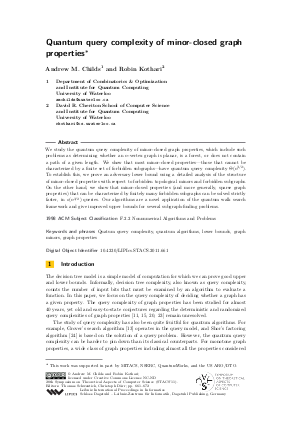Quantum query complexity of minor-closed graph properties
Authors Andrew M. Childs, Robin Kothari
-
Part of:
Volume:
28th International Symposium on Theoretical Aspects of Computer Science (STACS 2011)
Part of: Series: Leibniz International Proceedings in Informatics (LIPIcs)
Part of: Conference: Symposium on Theoretical Aspects of Computer Science (STACS) - License:
 Creative Commons Attribution-NonCommercial-NoDerivs 3.0 Unported license
Creative Commons Attribution-NonCommercial-NoDerivs 3.0 Unported license
- Publication Date: 2011-03-11
File

PDF
LIPIcs.STACS.2011.661.pdf
- Filesize: 0.82 MB
- 12 pages
Document Identifiers
Subject Classification
Keywords
- quatum query complexity
- quantum algorithms
- lower bounds
- graph minors
- graph properties
Metrics
- Access Statistics
-
Total Accesses (updated on a weekly basis)
0Document
0Metadata
Abstract
We study the quantum query complexity of minor-closed graph properties, which include such problems as determining whether an $n$-vertex graph is planar, is a forest, or does not contain a path of a given length. We show that most minor-closed properties -- those that cannot be characterized by a finite set of forbidden subgraphs -- have quantum query complexity Theta(n^(3/2)). To establish this, we prove an adversary lower bound using a detailed analysis of the structure of minor-closed properties with respect to forbidden topological minors and forbidden subgraphs. On the other hand, we show that minor-closed properties (and more generally, sparse graph properties) that can be characterized by finitely many forbidden subgraphs can be solved strictly faster, in o(n^(3/2)) queries. Our algorithms are a novel application of the quantum walk search framework and give improved upper bounds for several subgraph-finding problems.
Cite As Get BibTex
Andrew M. Childs and Robin Kothari. Quantum query complexity of minor-closed graph properties. In 28th International Symposium on Theoretical Aspects of Computer Science (STACS 2011). Leibniz International Proceedings in Informatics (LIPIcs), Volume 9, pp. 661-672, Schloss Dagstuhl – Leibniz-Zentrum für Informatik (2011)
https://doi.org/10.4230/LIPIcs.STACS.2011.661
BibTex
@InProceedings{childs_et_al:LIPIcs.STACS.2011.661,
author = {Childs, Andrew M. and Kothari, Robin},
title = {{Quantum query complexity of minor-closed graph properties}},
booktitle = {28th International Symposium on Theoretical Aspects of Computer Science (STACS 2011)},
pages = {661--672},
series = {Leibniz International Proceedings in Informatics (LIPIcs)},
ISBN = {978-3-939897-25-5},
ISSN = {1868-8969},
year = {2011},
volume = {9},
editor = {Schwentick, Thomas and D\"{u}rr, Christoph},
publisher = {Schloss Dagstuhl -- Leibniz-Zentrum f{\"u}r Informatik},
address = {Dagstuhl, Germany},
URL = {https://drops.dagstuhl.de/entities/document/10.4230/LIPIcs.STACS.2011.661},
URN = {urn:nbn:de:0030-drops-30521},
doi = {10.4230/LIPIcs.STACS.2011.661},
annote = {Keywords: quatum query complexity, quantum algorithms, lower bounds, graph minors, graph properties}
}
